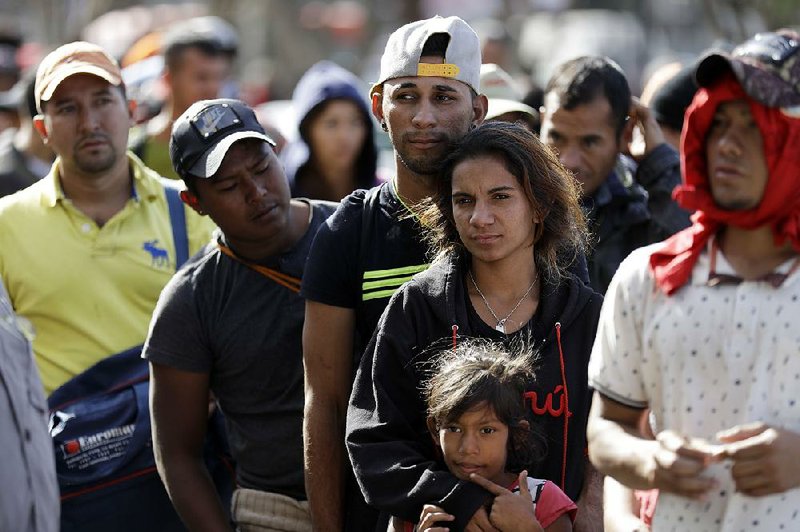TIJUANA, Mexico -- Members of a migrant caravan started to meet some local resistance as they continued to arrive by the hundreds in the Mexican border city of Tijuana, where a group of residents clashed with migrants camped out by the U.S. border fence.
About 100 migrants declined offers of rides to shelters and had camped out late Wednesday by the steel border fence at Tijuana's beach area, when a similar number of local residents marched up to the group shouting, "You're not welcome," and, "Get out!"
Police kept the two sides apart.
Vladimir Cruz, a migrant from El Salvador, said Thursday, "These people are the racists, because 95 percent of people here support us."
"It is just this little group that doesn't support us," Cruz said. "They are uncomfortable because we're here."
Playas de Tijuana, as the area is known, is an upper-middle-class enclave, and residents appeared worried about crime and sanitation. One protester shouted, "This isn't about discrimination, it is about safety!"
There are real questions about how the city of Tijuana will manage to handle the estimated 10,000 migrants in caravans working their way up through Mexico.
"No city in the world is prepared to receive this number of migrants," said Mario Osuna, the Tijuana city social development director. He said the city hopes the federal government "will start legalizing these people immediately" so they could get jobs and earn a living in Tijuana.
The migrants, who slept in overcrowded shelters and in tents with a view of armed U.S. Border Patrol agents, said they will wait for other migrants to join them before making their next moves.
Hundreds of migrants have arrived by bus in Tijuana since Tuesday, occupying the little space still available in the city's shelters and spilling onto an oceanfront plaza sandwiched between an old bullring and a border fence topped with recently installed concertina wire.
The first arrivals generally received a warm welcome, even though Tijuana's shelter system to house migrants was at capacity. Migrants lined up for food while doctors checked those fighting colds and other ailments.
Some migrants said they would seek asylum at a U.S. border crossing, while others said they might attempt to elude U.S. authorities by crossing illegally, or perhaps settle in Tijuana. But all of about a dozen people interviewed Wednesday said they would first wait for others from the migrant caravan to arrive and gather more information.
"We have to see what we're offered, just so they don't send us back to our country," said Jairon Sorto, a 22-year-old Honduran who arrived by bus Wednesday.
Sorto said he would consider staying in Tijuana if he could get asylum from Mexico. He said he refused to consider Mexico's offer of asylum in the southern part of the country because it was too close to Honduras and he didn't feel safe from his country's gangs.
The San Ysidro port of entry, the busiest crossing on the U.S.-Mexico border, processes only about 100 asylum claims a day, resulting in five-week waits even before migrants in the caravan began to arrive.
The first wave of migrants in the caravan, which became a central theme of the recent U.S. election, began arriving in Tijuana in recent days, and their numbers have grown each day. The bulk of the main caravan appeared to still be about 350 miles from the border, but has recently been moving hundreds of miles a day by hitching rides on trucks and buses.
Mexico has offered refuge, asylum and work visas to the migrants, and its government said Monday that 2,697 temporary visas had been issued to individuals and families to cover them during the 45-day application process for more permanent status. Some 533 migrants had requested a voluntary return to their countries, the government said.
Separately, the number of U.S. active-duty troops deployed to the U.S.-Mexico border has "pretty much peaked" at the current total of 5,800, the Pentagon's No. 2 official said Thursday.
That is far below the 10,000 to 15,000 that President Donald Trump initially said would be needed to secure the border against what he called an "invasion" of migrants.
Deputy Defense Secretary Patrick Shanahan was asked about the military mission one day after his boss, Defense Secretary James Mattis, visited troops near McAllen, Texas, and defended the use of the military for border security.
Shanahan did not go into detail beyond saying substantial additional troops do not appear to be required.
"We've pretty much peaked in terms of the number of people that are down there," he told reporters at the Pentagon. He noted that the current mission is scheduled to end Dec. 15, adding, "That could always be amended."
Information for this article was contributed by Robert Burns and Sagar Meghani of The Associated Press.
A Section on 11/16/2018
